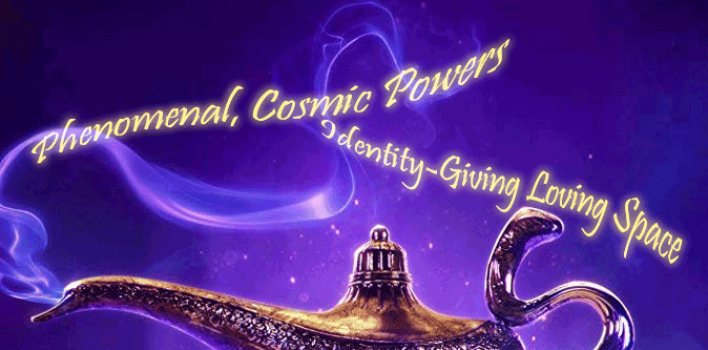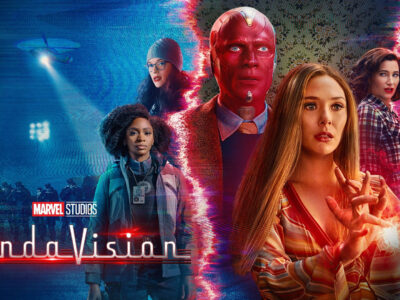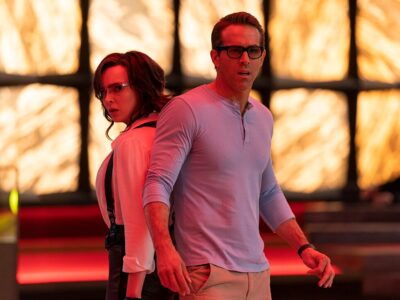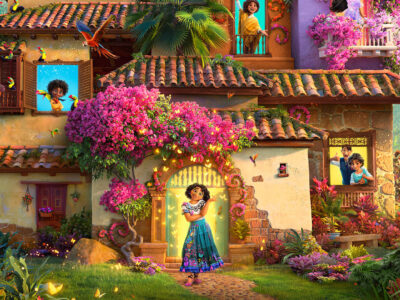Aladdin (2019): Phenomenal, Cosmic Powers; Identity-Giving Loving Space
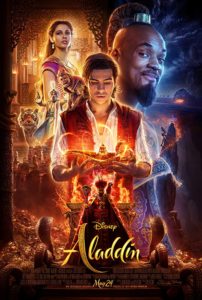 The luckless Aladdin, whose luck turns around; his beloved Jasmine, a princess far above his station; and Jafar, the dark vizier consumed with a dark purpose. The story would hardly be complete without identities concealed and then discovered; what else could you expect from a story whose hero is a “diamond in the rough?” And so, in the grandest tradition of Disney features, Aladdin (2019) is about becoming who you really are.
The luckless Aladdin, whose luck turns around; his beloved Jasmine, a princess far above his station; and Jafar, the dark vizier consumed with a dark purpose. The story would hardly be complete without identities concealed and then discovered; what else could you expect from a story whose hero is a “diamond in the rough?” And so, in the grandest tradition of Disney features, Aladdin (2019) is about becoming who you really are.
Disney has been driven by this story mechanic ever since Snow White’s Queen Grimhilde sought her identity within a magical talking mirror nearly a century ago. The company’s most enduring classics have wrestled with the question of identity; and since the recent live-action remake initiative is giving them the opportunity to revisit their most classic films, they’ve been able to drive home the idea with still more alacrity.
Guy Ritchie’s most recent installment is a remarkably fun and beautiful feature, with a more layered story, more breathtaking visuals, a greater set of musical performances, and more chemistry between the leads; in fact, were it not for Robin Williams and Jonathan Freeman’s turns as Genie and Jafar in the original, I believe that this one could have surpassed the animated classic (and, indeed, Naomi Scott’s brilliant performance nearly pushes it there on its own). But the interesting thing about the film is not its animated history. I’m more intrigued about its very thoughtful present.
Spoiler Note: You’re not going to be surprised by the plot beats, but character arc spoilers do follow for the 2019 Aladdin. The character arcs are beautifully and dramatically structured in a different manner than they were in the original, and if you haven’t seen the film, I think you should watch it before this article ruins it for you.
In the story’s live-action incarnation, we don’t see Aladdin and Jasmine and Jafar attaining their desires through striving harder or working for more, through magic spells or wishes (though they try all of these things). Instead, they find their true selves through their loves: Jasmine loves her people, and she becomes a queen. Jafar loves his power, and he becomes a slave. And Aladdin? Well, he was always a hero. But the way he discovers that is fascinating.
Jasmine
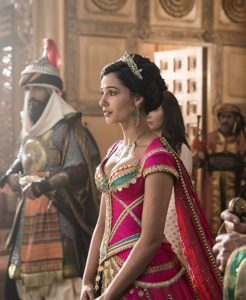 The original Jasmine was already a bit of an anomaly among Disney princesses; she was willing to stand up to the men of the story, did not instantly swoon at the sight of the lead, and generally seems to disdain even the thought that she might marry. But Naomi Scott’s marvelous portrayal takes her character to an entirely new level.
The original Jasmine was already a bit of an anomaly among Disney princesses; she was willing to stand up to the men of the story, did not instantly swoon at the sight of the lead, and generally seems to disdain even the thought that she might marry. But Naomi Scott’s marvelous portrayal takes her character to an entirely new level.
While the basics of Jasmine’s story have not changed (a princess, trapped by laws that regulate her coming and going and insist that she marry before she is considered valid, escapes her gilded cage), the motivations and personality have. Instead of just wanting to see the world, Jasmine longs to see her people again; to immerse herself in the culture and lives of Agrabah’s citizens. This sets the stage for her first big personality change, turning her from a woman with no ambition except to marry for love into a woman whose ambition is to lead the nation into a more prosperous and peaceful era which helps the people she loves.
She sets a perfect example of true leadership: a true leader loves, cares, and speaks for her people, leading even before she is officially tasked or even empowered to do so. Even when she feels trapped, kept from the people she longs to help, she finds ways to be the queen who she feels she’s meant to be. She’s willing to accept a terrible fate—maybe even her worst fear—to keep others safe.
And therein lies the reality of her identity: even before she’s fully attained it, she lives it. After Jafar uses the Genie’s powers to take control of the kingdom, it is her leadership and care for the people in her command which convinces Hakim to return his loyalties to the true Sultan. It is then that she proves to her father that she is worthy and prepared to be the Sultan herself.
Jasmine’s love solidifies her new identity and empowers her to live it even before her father has empowered her to execute it. It’s the way we’re motivated. Our love compels us to action, whether for good or for ill. That love and compulsion in Jasmine helps her people in a dark time. But Jafar’s love, his compulsion…those are a darker force.
Jafar
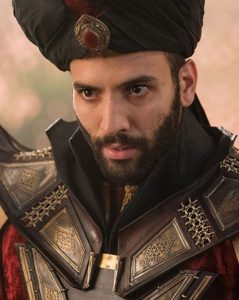 With the deepening of Jasmine into a primary character instead of merely a love interest as she was in the original, Jafar has also been developed into a more complex character, so that he can now serve not only as Aladdin’s foil, but also as Jasmine’s.
With the deepening of Jasmine into a primary character instead of merely a love interest as she was in the original, Jafar has also been developed into a more complex character, so that he can now serve not only as Aladdin’s foil, but also as Jasmine’s.
This version of the vizier was once a thief, like Aladdin. But, as he says in the desert, “Steal an apple, and you’re a thief. Steal a kingdom, and you’re a statesman.” And as Jafar rose from street rat to statesman, he developed a troubling mantra: “if you aren’t the most powerful person in the room, you’re nothing.” So while Aladdin would give up power in order to save and help others, Jafar would use others in hopes of gaining more power.
He doesn’t just want power, though. He wants to use that power; to express it and show it so that everyone knows he’s the most powerful man in the room, to take revenge against Shirabad for imprisoning him and to be the leader of the army that overthrows the world. He feeds on the difference in power between himself and the person beneath him, and proves that he doesn’t care about the people under his care in a literal way by destroying so much of the city with the giant Rukh in pursuit of his own power. Jasmine, conversely, operates on her mother’s admonition that she will only ever be as happy as her most miserable subject.
By the end of the film, Jafar has proven Genie right: “There is not enough money or power on Earth for you to be satisfied.” Jafar drinks deeply from it, and it becomes his downfall, enslaving him forever as a genie. His love for power and domination has defined his identity, and he collapses into a servitude wherein he will have neither.
In a way, his love for power returns him to what he always was: a poor thief, like Aladdin.
Aladdin
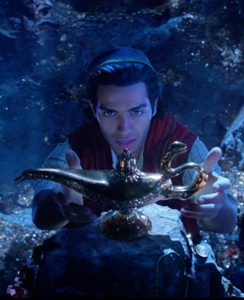 The titular hero of the film is probably the least changed of all the main characters by their magic carpet ride to live action. As always, when the film begins, Aladdin is discontent, trapped by his poverty, and largely without agency; all he has are his monkey and his sweet parkour skills.
The titular hero of the film is probably the least changed of all the main characters by their magic carpet ride to live action. As always, when the film begins, Aladdin is discontent, trapped by his poverty, and largely without agency; all he has are his monkey and his sweet parkour skills.
But even in these inauspicious beginnings he is a hero: giving his food to small children, rescuing other children from trampling by horses, helping the princess when she enrages a vendor, promising to save the Genie. His selflessness made him a hero.
Still, once he becomes Prince Ali, he starts becoming more and more pretend. Disregarding the Genie’s warning that “the more you pretend, the less you’re going to have,” Ali loses touch and grasp on his heroic self and pushes away the Genie. He’s truly beginning to become a street rat, despite his wealthy accoutrements and finery; and he hammers this home by returning to his homely little loft in full Ali dress.
In this moment, it isn’t his own love that reveals him for who he truly is. When he begins to feel a pull toward the same darkness that consumed Jafar, when he is at the beginning of a path that ends in enslavement, it is Jasmine’s love that brings him back to the light, turning him into the hero he always was.
To me, Aladdin’s path to his true self is the most representative of who I am. I know how strong the love I can generate is; or, rather, how weak it is. It’s only because of the love of Another that I can be who I truly am, who I was really made to be.
The love of Someone who was given phenomenal, cosmic powers—but gave it up for the “itty-bitty living space” of a human life because he loved so deeply.
The love of Someone who ruled everything—but gave it up to be made low for us.
The love of Someone who proves His worthiness to rule by His care and concern for his citizens and people.
By grace, I might someday be a leader like Jasmine. But today, because of a heavenly Love, I am empowered to be a hero like Aladdin.


